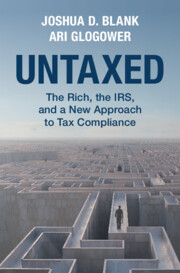3 results
Conclusion
-
- Book:
- Untaxed
- Published online:
- 22 November 2024
- Print publication:
- 28 November 2024, pp 239-242
-
- Chapter
- Export citation
Introduction
-
- Book:
- Untaxed
- Published online:
- 22 November 2024
- Print publication:
- 28 November 2024, pp 1-12
-
- Chapter
- Export citation

Untaxed
- The Rich, the IRS, and a New Approach to Tax Compliance
-
- Published online:
- 22 November 2024
- Print publication:
- 28 November 2024

